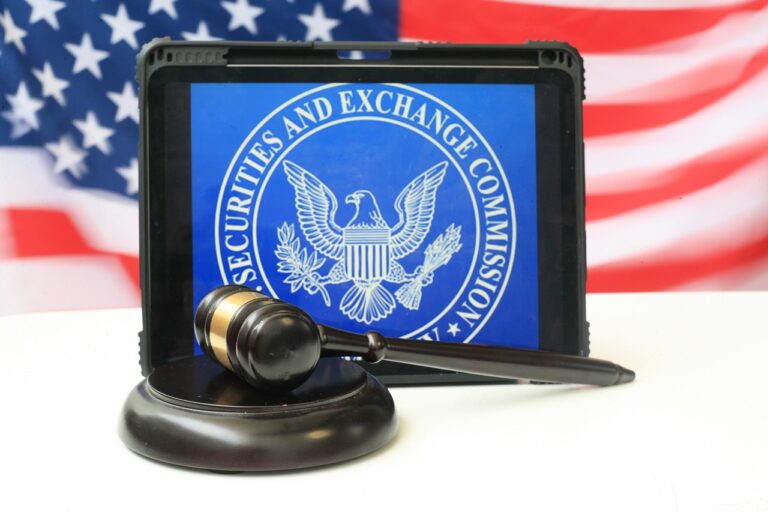
On 8 April 2024, U.S. SEC Commissioner Hester M. Peirce delivered a thought-provoking speech at the Association of Private Enterprise Education conference. Titled “Pourquoi Pas? Securities Regulation and the American Dream,” her remarks in Washington D.C. captured a critical discourse on the balance between regulation and innovation in the pursuit of the American entrepreneurial spirit.
Hester Peirce is a Commissioner at the U.S. Securities and Exchange Commission (SEC), appointed first by President Donald Trump in January 2018, and reappointed for a second term ending in 2025. She is known for her advocacy of less regulatory restraint in the innovation of financial technologies, and for her constructive approach to cryptocurrency regulation.
Peirce has been given the nickname “Crypto Mom” by the cryptocurrency community. This endearment stems from her dissenting statement regarding the SEC’s decision to reject a Bitcoin exchange-traded fund (ETF) application in 2018. In her dissent, Peirce criticized the SEC for not embracing innovation and for applying an overly rigorous standard to cryptocurrency products compared to other financial products. Her stance showed a supportive understanding of cryptocurrency as an emerging technology that could benefit from adapted regulatory approaches rather than outright restrictive measures.
Her advocacy extends beyond just cryptocurrencies; she has often argued for a regulatory framework that allows for innovation and development within the financial sector. Peirce’s perspectives are particularly significant in the context of evolving global financial technologies, where she is seen as a voice for potential regulatory reform to support innovation while still protecting investors. Her work and public statements often emphasize the importance of not stifling innovation with overly cautious or harsh regulatory measures, aligning with the ethos of fostering American economic growth and competitiveness in global financial technologies.
Commissioner Peirce began her address by underscoring the informal yet quintessential American response to innovation and new ideas: “Pourquoi Pas,” or “Why not?” This mindset starkly contrasts with more restrictive attitudes prevalent in other parts of the world where the question is “Pourquoi?” or “Why?”—a fundamental difference that she argues can either foster or hinder entrepreneurial initiatives.
Drawing on an anecdote from her travels in France, Peirce recounted a conversation with a ride-share driver who admired the United States as a land of opportunity and freedom—a place where one’s ideas and efforts to stand out and innovate are met with encouragement rather than skepticism. This discussion served as a springboard for her to delve into the core responsibilities and challenges of the SEC in fostering an environment conducive to innovation while ensuring market stability and integrity.
<!–
–>
Peirce emphasized that the SEC’s role isn’t just about enforcing regulations but also about enabling access to the capital markets. She mentioned that this access fuels the American economy, allowing businesses to grow and prosper. However, she expressed concern over the trend toward more prescriptive regulations, which she believes can stifle the entrepreneurial spirit that drives the American economy.
For instance, Peirce criticized the SEC’s cautious approach to cryptocurrencies and other financial technologies. She pointed out that overly cautious regulation can deter innovation, particularly in fields like cryptocurrency, where the U.S. has been slow to provide a clear regulatory framework. This hesitance, according to Peirce, contrasts sharply with the American ethos of “Why not?” and poses risks not just to the evolution of technology but to the very nature of American competitiveness on the global stage.
Further, Peirce discussed the balance required in regulation—protecting investors from fraud while not curbing legitimate business activities. She noted that regulation should not be about discouraging investment in new ventures just because they might fail. Instead, she believes, it should provide a clear and predictable framework within which innovation can thrive. She said that this involves establishing ground rules that are enforced fairly and consistently, without unnecessarily hindering new market entrants or innovations.
The Commissioner also highlighted the importance of regulatory humility, acknowledging that regulators do not always know what the future holds or how new technologies might evolve. As such, she advocated for a regulatory approach that is adaptable and responsive, allowing for iterative feedback and adjustments rather than rigid prescriptions.
Peirce’s call for a reconsideration of how securities laws are applied is particularly pertinent in light of emerging technologies. For example, the rise of AI and blockchain poses new challenges for regulators. The SEC, she argues, should be a facilitator in helping the market understand these technologies while ensuring they do not harm the broader market ecosystem.
In closing, Peirce stressed the need for the SEC to continue to encourage innovation through a regulatory framework that supports rather than suppresses the American entrepreneurial spirit. She argued that America’s economic success has been built on its openness to new ideas and its willingness to allow individuals the freedom to succeed—and fail. She stressed that regulation, while necessary, should not dampen this spirit but should instead be crafted to harness and enhance the creative potential that drives the nation forward.
Featured Image via Pixabay
- SEO Powered Content & PR Distribution. Get Amplified Today.
- PlatoData.Network Vertical Generative Ai. Empower Yourself. Access Here.
- PlatoAiStream. Web3 Intelligence. Knowledge Amplified. Access Here.
- PlatoESG. Carbon, CleanTech, Energy, Environment, Solar, Waste Management. Access Here.
- PlatoHealth. Biotech and Clinical Trials Intelligence. Access Here.
- Source: https://www.cryptoglobe.com/latest/2024/04/crypto-mom-speaks-out-u-s-sec-commissioner-hester-peirces-bold-vision-for-regulating-digital-assets/
- :has
- :is
- :not
- :where
- 16
- 2018
- 2024
- 2025
- 4
- 5
- 8
- a
- About
- access
- According
- activities
- adapted
- address
- adjustments
- Ads
- advocacy
- AI
- AI and blockchain
- aligning
- All
- allow
- Allowing
- allows
- also
- always
- American
- American economy
- an
- and
- Application
- applied
- Applying
- appointed
- approach
- approaches
- April
- April 2024
- ARE
- argued
- Argues
- AS
- Association
- At
- Balance
- BE
- because
- been
- began
- believes
- benefit
- between
- Beyond
- Bitcoin
- blockchain
- broader
- built
- business
- businesses
- but
- by
- call
- CAN
- capital
- Capital Markets
- captured
- cautious
- challenges
- clear
- closing
- commission
- commissioner
- community
- compared
- competitiveness
- Concern
- Conference
- consistently
- constructive
- context
- continue
- contrasts
- Conversation
- Core
- could
- crafted
- Creative
- critical
- criticized
- crypto
- Crypto regulations
- cryptocurrencies
- cryptocurrency
- cryptocurrency regulation
- CryptoGlobe
- curbing
- D.C.
- decision
- delivered
- delve
- Development
- difference
- discourse
- discussed
- discussion
- do
- donald
- Donald Trump
- dream
- dreams
- driver
- drives
- Economic
- Economic growth
- economy
- ecosystem
- Education
- efforts
- either
- embracing
- emerging
- emerging technologies
- Emerging Technology
- emphasize
- emphasized
- enabling
- encourage
- ending
- enforced
- enforcing
- enhance
- ensure
- ensuring
- Enterprise
- entrants
- entrepreneurial
- Entrepreneurial Spirit
- Environment
- establishing
- ETF
- Ether (ETH)
- Ethos
- evolution
- evolve
- evolving
- example
- exchange
- Exchange Commission
- exchange-traded
- exchange-traded fund (ETF)
- expressed
- extends
- facilitator
- FAIL
- fairly
- feedback
- Fields
- financial
- financial products
- Financial sector
- financial technologies
- First
- For
- Forward
- Foster
- fostering
- Framework
- France
- fraud
- Free
- Freedom
- from
- fuels
- fund
- fundamental
- future
- given
- Global
- global financial
- Ground
- Grow
- Growth
- harm
- harness
- helping
- her
- Hester Peirce
- Highlighted
- hinder
- holds
- How
- However
- HTTPS
- humility
- ideas
- image
- importance
- in
- In other
- individuals
- informal
- initiatives
- innovate
- Innovation
- innovations
- instance
- instead
- integrity
- into
- investment
- Investors
- involves
- IT
- ITS
- January
- jpg
- just
- Kind
- Know
- known
- Land
- Laws
- legitimate
- less
- light
- like
- Market
- Markets
- measures
- mentioned
- met
- might
- Mindset
- modernizing
- more
- nation
- Nature
- necessary
- Need
- New
- New Market
- New technologies
- noted
- of
- often
- on
- Openness
- Opportunity
- or
- Other
- our
- out
- outright
- over
- part
- particularly
- parts
- People
- perspectives
- Place
- plato
- Plato Data Intelligence
- PlatoData
- poses
- potential
- Predictable
- Prescriptions
- president
- President Donald Trump
- prevalent
- private
- Products
- prosper
- protecting
- provide
- public
- pursue
- pursuit
- question
- quintessential
- rather
- reform
- regarding
- Regulation
- regulations
- Regulators
- regulatory
- reject
- required
- response
- responsibilities
- responsive
- Restrictive
- rigid
- rigorous
- Rise
- risks
- Role
- rules
- s
- Said
- Screen
- screens
- SEC
- SEC Commissioner
- Second
- sector
- Securities
- Securities and Exchange Commission
- Securities Laws
- seen
- served
- she
- should
- showed
- significant
- sizes
- Skepticism
- slow
- speech
- spirit
- Stability
- Stage
- stance
- stand
- standard
- Statement
- statements
- States
- stems
- stifle
- Still
- success
- such
- support
- supportive
- Supports
- Technologies
- Technology
- term
- than
- that
- The
- The Capital
- The Future
- the world
- their
- These
- they
- this
- thought-provoking
- Thrive
- Through
- titled
- to
- toward
- travels
- Trend
- true
- trump
- u.s.
- U.S. SEC
- U.S. Securities
- U.S. Securities and Exchange Commission
- U.S. Securities and Exchange Commission (SEC)
- understand
- understanding
- United
- United States
- unnecessarily
- us
- use
- Ventures
- very
- via
- vision
- Voice
- washington
- Washington D.C.
- What
- which
- while
- WHO
- why
- Willingness
- with
- within
- without
- Work
- world
- yet
- zephyrnet












